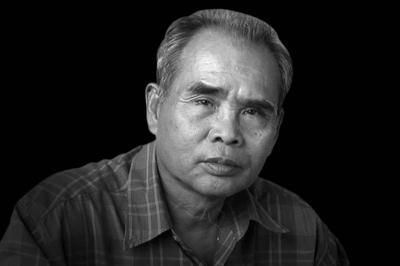Mahn Sha: The Compassionate Revolutionary
When news of the assassination of the Karen leader Mahn Sha broke, I was reminded of the advice he had once given me: “Use your journalistic skill to help poor people.”
 |
Mahn Sha was born in a small village in Pan Ta Naw Township, Irrawaddy Division, in 1943, son of a poor farmer. At that time, Irrawaddy Division had a very strong revolutionary movement, in which the Communist Party of Burma and the independent Karen National United Party (KNUP), vanguard wing of the Karen National Union (KNU), were prominent.
“This movement in Mahn Sha’s area influenced him to believe in leftist revolutionary politics,” according to Thamein Tun, a close associate from the early 1960s. “This could also have set his defining beliefs in building alliances across ethnic lines, his empathy with oppressed communities and his deep understanding of the daily suffering of poor farmers.”
A local KNUP leader noticed his potential and intellectual curiosity and helped him enter university in Rangoon, where he studied history.
During his university years, Mahn Sha became active in underground politics, distributing KNU statements and giving speeches. He was also involved in the student protests of July 1962, when Ne Win took power.
Mahn Sha joined the KNU in the jungle in the mid-1960s, working at first in media and public relations, areas where he showed talent. He was known as a man who believed in “criticism and achievement,” challenging the work and ideas of several Karen leaders.
In 1974 and 1986, Mahn Sha and other ethnic leaders travelled to the Chinese border to establish a joint military agreement with the Burmese communists.
On his return, he was demoted and sent to the frontlines by Gen Saw Bo Mya, a right-wing, anti-communist.
In 1988, Mahn Sha became personal assistant to KNU leader Gen Bo Mya, playing a key role in advising students who fled from the cities to the jungle after the 1988 crackdown, instructing them how to organize themselves and fight guerilla warfare. He was a key supporter of the All Burma Students’ Democratic Front (ABSDF).
“A very important thing he did was to act as a bridge between Burmese democracy groups, translating and explaining the positions of KNU leaders,” said former ABSDF leader Naing Aung. “He would also spend a lot of time helping KNU leaders understand the political position of the democracy groups.”
Mahn Sha became general secretary of the KNU in 2000. He strongly promoted the idea of a federal constitution and supported the drafting process. He tried to practice democratic ideals, supporting independent media and free debate within community organizations.
Paul Sein Htwa, director of the Karen Environment Social Action Network, an independent environmental organization based in Chiang Mai, Thailand, said Mahn Sha was “a model leader for the next generation.”
Sein Htwa said: “He always tried to give us time for suggestions and encouragement for the development of our work.” Many community and nongovernmental organizations felt the same way.
Win Min, an exiled political analyst, said: “He could have been a great future leader in a Burma with a federal government, as he was fully aware of ethnic and democracy issues. It was believed he could bring peace and understanding between democracy forces and ethnic nationalities.”
Mahn Sha was often uncompromising in his beliefs, particularly in his dealings with the regime and was frequently criticized for his strong positions on various political issues.
He could not stop the breakup of the KNU or unify the Karen movement. It must be remembered, however, that he was one of three KNU leaders.
The death of Mahn Sha is a great loss for the Karen and democracy movement. They can learn from the lessons of his life and his model of activism: building alliances, showing solidarity with other groups, his many small acts of kindness and his toleration of a civil society and debate.
